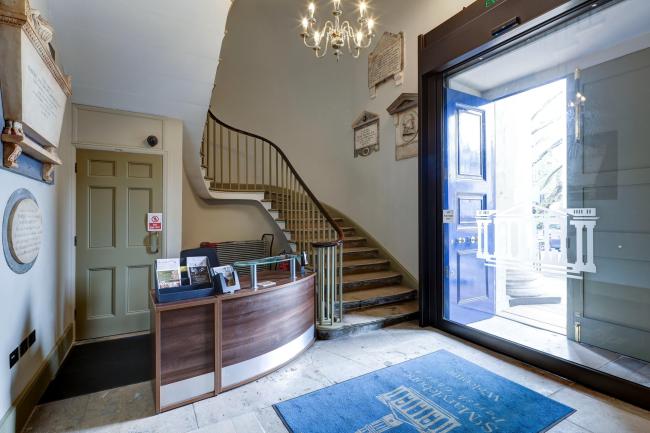Churches are the beating hearts of communities, providing vital support to local people. In many of them, you will find essential services based out of these historic buildings. Hear from St Marylebone parish church in London, which is home to both a GP practice and a counselling service, about how hosting these services have helped their church and community to thrive.
Mind, body and spirit
“A previous rector called Revd Christopher Hamel Cooke... he had this vision that the church should be mind, body and spirit. So that's when he started the NHS. We've got an NHS practice in the crypt [basement], which sees about 20,000 patients,” shares Suzanne, who leads the counselling service at St Marylebone.
“And then he set up the therapy centre for people's mind. So, the NHS is for the body... [The counselling clinic] is for the mind and of course the church is for the spirit. And I think it was a real vision that this should be a place where all aspects of people can be addressed, and it still continues. The NHS service is still there and so it's been since the early 1980s that it's been in existence.”
This feeling that the church should be a place that caters to everyone is the ethos behind much of what happens at St Marylebone.
Support for everyone
The church runs a drop-in mental health group, ran by qualified therapists. The counselling support they offer is more long-term, so there is something for everyone.
There is first a consultation, to see if the counselling is appropriate for the person. If this is the right next step, they can offer two years of support. While this does limit the number of clients each therapist can take on, providing this long-term care is important – especially as other counselling centres are now having to cut down to six months or only a year of support.
There is also a sliding scale of payment available – so that everyone can benefit from this support. No matter what someone is earning, or even if they are receiving benefits, the team works with the individual to come up with a payment plan that is affordable.
A welcoming space
“We have a permanent NHS GP surgery,” says Ashley, who use to work at St Marylebone and helped to manage the building.
“Although we're working alongside each other day by day, they're very much run independently. So, they rent the room from us and the space from us and we provide a team here that look after the building and make sure that they have everything they need.”
The church has clear sign posting throughout the building, so that people coming to use the GP surgery, or the counselling services are able to find their way easily. There’s a reception desk by the entrance too.

Benefits of working from a church
Working from a building that is a community hub has its benefits for the counselling services and GP surgery – but also for the congregation and church too.
“It's really great for us to feel the support of the rest of the team who have very different jobs,” explains Suzanne. “...Our therapists can mingle with other people who are working in the church and just have a chance to really feel we're part of a community.”
“I have spoken to the congregation... I've spoken at Mental Health Week and it's amazing how many people in the church didn't really know about us. So, we've had open afternoons where the church has come down, the members to see what we do, and everybody's really blown away that this is all going on.
“We see about 80 people a week. So, it's just like a hive of activity, but it, it's down in the crypt so it's sort of quiet. It's very peaceful and it's a great place really to offer the service that we do.”
By renting out space or letting these services be housed in the church for free, St Marylebone have been able to help their congregation and wider community get access to the support they need. It is a great example of how churches right across the UK continue to be at the forefront of community care.
For Churches: top tips for your place of worship
- If you’re starting from scratch, get the local community and your congregation involved. What support could you host in your church that could help them? Talk with your local council and see if there is a way you could work with them to offer a vital local service from your building.
- Review the rooms in your building that you could offer to community groups and think about a pricing structure that could enable them to thrive but also create a vital income stream for your church. Here is a useful article with things you will need to think about.
- Review how accessible your church is to the public. Do you need clearer signposting inside and outside? Can you put a reception desk near the entrance to help direct people to where they need to go? If you would like to update your kitchen or toilets – or add them in – to make your building more welcome, we offer facilities grants that may be able to help you.
- If you’re already running a support group within your church, there are opportunities to inform the church more about what you’re doing. You could host a themed talk – like St Marylebone did for Mental Health Week and offer a tour. This will help your church become more engaged with your building and may help recruit more volunteers to help host these groups.

